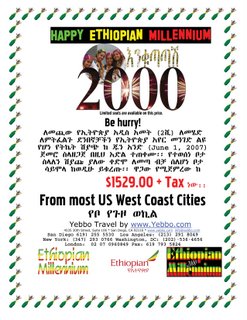In 1945, Emperor Haile Selassie established Ethiopian Airlines (with the help of TWA), which the next year began flights from Addis Ababa to Cairo. As Anthony Sampson recounts in "Empires of the Sky," other African countries were so desperate to establish flag carriers that Royal Swazi operated a fleet with only two planes and Air Botswana just three; at its founding, Gambia Airways was known as "Gambia Stairways" because it did little more than service other airlines.


By Sasha Issenberg November 19, 2006
US AIRWAYS'S HOSTILE BID for Delta last week has ensured that talk of airline consolidation will fill the business pages well into the new year. It may have also assured that a quieter, yet perhaps equally significant, agreement between airlines may go unnoticed.Early next year, when Japan Airlines becomes a member of the Oneworld Alliance, an underappreciated chapter will close in the history of the airline industry -- and indeed in the history of the modern nation-state. JAL, the last large international airline to sign onto one of the three major cooperative partnerships, will join the smallest of them, currently dominated by British Airways and American Airlines. JAL's move marks the culmination of a decade-long flurry of agreements and treaties that have divided the air among Oneworld, c, and the Star Alliance in much the same way that the great powers divided the earth at the turn of the last century. It also marks the symbolic death of one of that era's defining institutions: the flag carrier.
In the 20th century, there was perhaps no more important trophy of sovereignty than the parastatal airline -- "the chosen instrument of the state," as Britain's Imperial Airways described itself in the 1930s, when Air France and the Soviet Union's Aeroflot also first took to the skies.
For the new countries of the post-imperial epoch, meanwhile, a state-owned airline, like sending an athlete to the Olympics and occupying a seat in the United Nations General Assembly, was an indispensable step on the road to statehood. In 1945, Emperor Haile Selassie established Ethiopian Airlines (with the help of TWA), which the next year began flights from Addis Ababa to Cairo. As Anthony Sampson recounts in "Empires of the Sky," other African countries were so desperate to establish flag carriers that Royal Swazi operated a fleet with only two planes and Air Botswana just three; at its founding, Gambia Airways was known as "Gambia Stairways" because it did little more than service other airlines.
Japan Airlines was founded in 1952, at the end of the United States' postwar occupation. The traditional crane on the tail of JAL aircraft was conceived as the aerodynamic ambassador of a peacetime nation with something of an image problem when it came to airplanes.
But where flags once ruled, now the skies belong to coalitions. Alliances have their origins in reciprocal frequent-flier exchanges and bilateral code-sharing practices that allow airlines to lease and sell seats on each others' flights. Such cooperation was pioneered by Northwest and KLM Royal Dutch Airlines, whose 1991 pact permitted flyers to move (along with their luggage and a single ticket) between connecting flights on the two airlines as though they were a single carrier.
Today, such alliances offer economic efficiencies worth more than national pride. JAL spokesman Stephen Pearlman noted that Oneworld offers the prospect of combining sales and airport lounge operations. "Multilateral alliances have matured since they started some years ago," he said. They've also expanded their reach. Airtran and Frontier Airlines announced last week that they would forge the first alliance of low-cost carriers.
Countries that once wanted to impress with autonomy now are interested in displaying their integration in the global economy, and are looking to join alliances instead of hoisting their own flags. When, earlier this year, South Africa Airways became the first African carrier to join an alliance, local media trumpeted a national victory and Thabo Mbeki celebrated by welcoming Star Alliance executives to his presidential guesthouse.
This globalization of airline power has stripped airport concourses of their United Nations-like pageantry and replaced it with a bland iconography typical of transnational corporations. Travelers find themselves checking into Oneworld counters and having a cocktail in a Skyteam lounge and, increasingly, boarding a jumbo jet whose fuselage and tail are emblazoned not with the name and colors of a country but the Star Alliance insignia and its banal navy-and-white scheme. (The operating airline's logo usually remains in fine print below.)
But alliances pose more than just an aesthetic threat to national identity -- they can also lead to the type of industry consolidation that is putting parastatals out of business. Air France and KLM had already begun to integrate operations as Skyteam mates before the two joined in 2004, easing their way into a merger that created the largest airline company in the world. Sabena, the airline of neighboring Belgium, failed to join one of the major alliances, and folded in 2001.
Even though Air France and KLM continue to operate flights under their own brands, the planes next to them on European tarmacs are increasingly vagabond low-cost carriers like Easyjet and Vueling that project a studied placelessness. The most successful of them, the Dublin-based RyanAir, is now rumbling about acquiring Aer Lingus, Ireland's 70-year-old national airline.
There is still a place in which flyers, giddy with the thrills of statehood, cling eagerly to their new parastatals. At the newly rebuilt Sarajevo International Airport, where the airy departure hall and freshly pristine macadam are both free of the pockmarks that still pattern most Bosnian building surfaces, the arrivals board reads like a monument to the Balkans' nation-building success. There the nascent national airlines of young former Yugoslavian states -- Croatia Airlines, Slovenia's Adria Airways, Serbia's Jat Air, and Bosnia and Herzegovina's B&H Airlines, previously Air Bosna -- hold their own alongside the venerable flag carriers Alitalia, Turkish, and Malev Hungarian Airlines.
Amid blurred lines of religious and ethnic character, such public displays of national identity may be essential. Entangling empires, after all, sit ominously in Balkan memories. It was just a few miles from the airport where, in 1914, an Austro-Hungarian figurehead was shot for having the audacity to parade through Sarajevo on a Serbian national feast day.
Yet the Balkans will not likely be able to avoid the expansion of alliances for long. On Ferhadija, Sarajevo's main pedestrian strip, near the intersection where Austro-Hungarian paving stones auspiciously give way to Ottoman cobble, the shingle outside the Adria Airways sales office describes the company as a "Regional Member of the Star Alliance," a status it has held since 2004. Across the street, the Slovenian flagship's proud outpost is dwarfed by the oversized logos of Lufthansa and Austrian Airlines, the alliance's Mitteleuropean full members. It is perhaps no coincidence Adria joined the Star Alliance the same year Slovenia acceded to the European Union.
In January, Slovenians -- after just 15 years of independence, following the fall of Yugoslavia -- will trade in their battered tolar coins for euros. For now, the news fills them with a new, postnationalist variety of pride: This summer, the Slovenian government hosted a street party in Brussels to celebrate. Any 21st-century country can have its own currency, after all, but paying with euros is for the select few, just as everyone from Bangladesh to Peru can claim a homegrown airline, but only the elite get to code-share with Singapore Airlines or United. Let's see how that warm feeling fares after some adverse decision made in Brussels or, perhaps, when the national beer on board is replaced with Heineken.


No comments:
Post a Comment